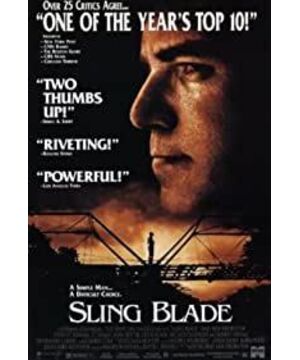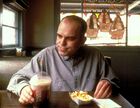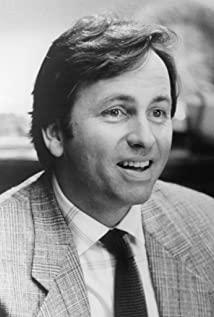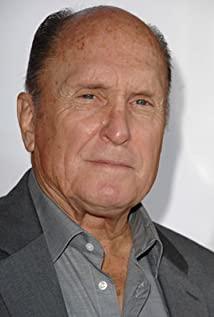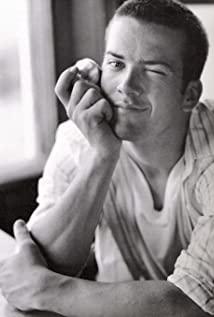At first, I couldn't watch it, because the latter part seemed to describe how he couldn't bear to kill people... But after watching the score, I insisted on reading it, but found that what the director wanted to say might not be just a tragedy.
Can’t help but wonder: what’s wrong with this world, need to rely on a child (he used to be this child) or a "lunatic" to be able to "justify"? !
Why did the others go? Can others not solve it? Why do they put pressure on him one by one and come to him to complain? Isn't this an obvious push to push him into the fire pit? (This is also the reason why I can't watch the first half. If the director + screenwriter only stays at this level without suspense, then the second half is really long-winded)
But the level of others is indeed high, and wonderful!
The villain boyfriend in the story never showed how he really hurt people with violence. All aspects of his evil are "heard"...Even the only scene that will break out is when the band leaves. The conflict is on the verge of breaking out. As a result, he shrinks in the corner to avoid children throwing things. It turns out that he is just bluffing, and the biggest problem is not violence. , But inferiority + owe. (Similar to the other lunatic who always talks to the male lead in the lunatic asylum and brags about his "violent experience".)
And those "good people" that are largely described in the film. Mothers, children, homosexuals, deans, repair shop owners... these good people in the general sense are actually subjectively and arbitrarily-"let go."
On the surface, the mother loves the child, but does not consider him to bring clothes that are completely beyond his ability; to attract an unqualified man is to find him a father (on the one hand, he comforts the child, on the other hand, he makes the man mentally hurt the child again and again, and also Tolerate his bluffing. I think the only reason may be that this woman really likes this man, making herself like a victim, in fact she can’t live without it); there is no space in the story to show how she really cares about the child’s feelings...
Homosexuals treat mother and child as family members, but when he feels "dangerous", he will only find a madman to complain... (He is not afraid to stand up and resist, is this looking for allies to appear that he is not so weak? Or is he to stimulate? The other party?)
The dean is also a good person in the general sense. He has done a lot for him, but he only stays at a level that is slightly more humane than "rules". When he was put in a lunatic asylum, he had no intention of examining the truth; after he walked out of the hospital and returned to the hospital, he had no intention of considering his mental adjustment problems; he had no intention of knowing the inside story after he had stayed in his house for a night without sleep; after he transferred to the little boy’s house He has no intention of investigating the situation of the new address...because he has done his part and is already quite a good person. (This is also the life philosophy of most people. I don’t care about the truth, as long as my life is peaceful and smooth. Be an ordinary good person)
There is also the child's "good father", who was cowardly and irresponsible, and was able to die to escape responsibility. (Perhaps this is his mother telling the child how good his father used to be, and perhaps using these words to stimulate the new boyfriend, so he is so hostile to this little boy...)
At the end of the story, he told the "patient" to go away and stop talking about himself. As a result, he owed the patient to decisively flashing people... It seemed to imply that-if these good people really want to solve real problems, in fact, they only need to be tough enough to do that ( Not too bad) The bad boyfriend said "get out"!
I believe that bad boyfriend will leave immediately!
He can "do bad" because these good people who indulge him are used to it! And this result has contributed to the child-like innocent male protagonist "coming forward"—it is equivalent to saying: This world of inaction is forcing children whose values are not black and white to go crazy.
The reason for the madness lies in the adult's-inaction!
We bring new lives into this world one by one, but we are not responsible enough for them. I live so-so, and let a new life grow up into another "adult" in a so-so.
What an "adult"!
————————————————————————————————————————
The male protagonist in the film is a child whose heart has not fully grown up from beginning to end. The director does not intend to give him a straight body, saying that this is a genius rather than a madman! He was a madman or a child from beginning to end.
The way he sees the world is both good and evil, adding some intermediate shades through the Bible in the hospital. But still can't think about complex interpersonal issues. It's as if he thinks that people say that her boyfriend is terribly bad, he will believe so and think that he is absolutely violent. It’s the same way that boy thinks...but in reality, adults will see that the boyfriend’s problem is not violent but just owe it.
Therefore, the director definitely did not write from the perspective of "violence should be controlled by violence"! On the contrary, with a very subtle and subtle irony technique, let the audience with a certain degree of maturity see the foreshadowing buried along the way-the adult world of inaction will be a lunatic asylum for children!
The child is not yet able to discern the truth under the surface, and will believe what you tell him. If the worldview he has received since childhood is distorted, he can only grow up to be a male protagonist at best, who is either black or white as an adult. They can only defend "justice" in extreme ways. The problem is too complicated beyond their understanding...
Justice seems simple, just eliminate evil! Being a hero seems easy, just pick up the knife and get rid of the bad guys! But what is evil? What is justice? Why bring a new life into this world?
View more about Sling Blade reviews


